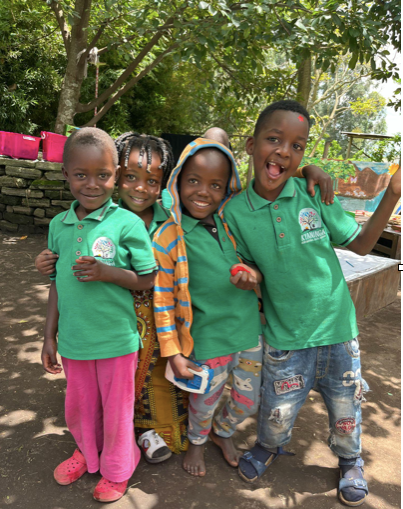The challenge facing disabled children in Uganda
Steve Williams describes how the birth of his own son inspired him to establish a child development centre in the East African nation

Your support helps us to tell the story
From reproductive rights to climate change to Big Tech, The Independent is on the ground when the story is developing. Whether it's investigating the financials of Elon Musk's pro-Trump PAC or producing our latest documentary, 'The A Word', which shines a light on the American women fighting for reproductive rights, we know how important it is to parse out the facts from the messaging.
At such a critical moment in US history, we need reporters on the ground. Your donation allows us to keep sending journalists to speak to both sides of the story.
The Independent is trusted by Americans across the entire political spectrum. And unlike many other quality news outlets, we choose not to lock Americans out of our reporting and analysis with paywalls. We believe quality journalism should be available to everyone, paid for by those who can afford it.
Your support makes all the difference.I thought the six long years spent building my dream safari lodge in Uganda was going to be the biggest challenge of my life. But my biggest struggle came when my wife, Asha, and I gave birth to our son, Sidney.
Sidney was born with severe epilepsy and developmental delay. We struggled to find any appropriate care in Uganda, and realised that many other families were facing similar and even greater challenges.
In 2014 we felt compelled to create the Kyaninga Child Development Centre [KCDC] with the help of Fiona Beckerlegge, a paediatric physiotherapist.
Children with disabilities are one of the most marginalised groups worldwide. In Uganda, 13 per cent of all children - more than 2.5 million - are living with a disability. However the widespread local belief that disabilities are an ‘untreatable curse’ mean that these children and their families are frequently ostracised from their communities, educational and healthcare institutions, as well as from social and leisure activities.
The KCDC is currently the only NGO in Western Uganda taking a holistic, community-based approach to disability, primarily providing specialised and affordable healthcare, education and assistive technology.
The Therapy and Rehabilitation Centre was the starting point for the KCDC. It now reaches over 900 children a month, providing them with physical, occupational and speech therapy, as well as orthopaedic splinting and casting. In its twice-daily outpatient clinics, it also offers special education and support to individuals, as well as community-based rehabilitation for homes, schools, and local health centres.
The KCDC also works to help educate the 91% of children with disabilities in Uganda not enrolled in primary school. This is carried out through their Kyaninga Education Hub, which equips local teachers with the knowledge and tools to deliver inclusive education and participatory learning for all. Meanwhile, Kyaninga Inclusive Model School, helps to realise this vision by bringing together children with disabilities and typical learners from diverse socio-economic backgrounds to learn side-by-side.
After discovering that in Uganda only 0.5 per cent of people who need a wheelchair have one, we started Kyaninga Mobility. This initiative produces and supplies high-quality, low-cost, terrain-suitable wheelchairs and other mobility aids. Once production begins later this year, all aids will be provided free of cost to children at KCDC, with third-party purchases enabling the company to become financially self-sustainable and the remaining profits being reinvested straight back into the KCDC.
We also support caregivers, family members and local communities, and have helped over 5,600 children with disabilities and their families over the past eight years.
Beyond our main programmes, the KCDC also offers community nutrition clinics for managing malnutrition, as well as community epilepsy clinics, a Street Business School for female caregivers of children with disabilities and a variety of community awareness and advocacy workshops.
Despite being a registered charity, one of the KCDC’s major financial contributors continues to be the lodge that I built all those years ago. Kyaninga Lodge is a luxury experience with a truly Ugandan feel.
Overlooking the spectacular view of Lake Kyaninga, the natural forest and the stunning Rwenzori Mountains; and designed to harmonize within this landscape, Two years were spent training the local communities in the skills required for the lodge’s construction. With an emphasis on using locally-sourced building materials, Kyaninga Lodge was built without cranes or lifting machines and now runs almost entirely on solar power.
Looking forward to the rest of 2023, the KCDC plans to soon move into their new premises, a facility we hope will become a beacon of excellence for disability management, whilst also bringing all their services under one roof.
Until then, I know that I, with the inspiration my son gives me, and the KCDC will continue to pursue their goal of making a deep impact on every child with a disability and their family within the Western Ugandan region.
Unsurprisingly, this affects children’s overall health outcomes and development, as well as impeding the economic independence of their families.
Steve is the Co-Founder of the Kyaninga Child Development Centre (KCDC) (www.kyaningacdc.org) and creator of Kyaninga Lodge (www.kyaningalodge.com)
Join our commenting forum
Join thought-provoking conversations, follow other Independent readers and see their replies
Comments